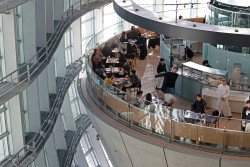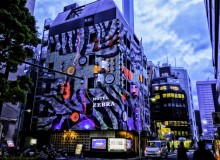
Originally published on metropolis.co.jp on May 2011

Courtesy of Mothercoat
Innovation is the very soul of art, and music is no exception. In this commodity-driven world it’s easy to forget that music should be both art and entertainment. Not so for Mothercoat, who take creation seriously. Example: after months of signalling the release of their new album Egobag, flyering live houses across the country and releasing promo videos, they delayed the launch because the drum sound wasn’t perfect.
“We weren’t satisfied,” they tell Metropolis. “Recording is kind of a gamble to make the miracle sound so it took more time than we expected.”
Mothercoat have been a much-respected staple of the music scene since the release of their debut album Interphone in 2005, though only singer Giga, bass player Toki and sound engineer Junpei survive from the original line-up. Egobag is technically their fifth album, but is being touted as their first.
Why? “We changed members many times, actually,” says Toki. “We have no albums with the exact same members so all of them are first albums.”
This fluctuation has transformed their sound. “You can tell the change clearly in the drum sound, I think,” says Toki. “On Patchwork Shiki, our last album, the guitar was only Giga, but on this album we had another guitar so the arrangement is more interesting.”
What influences do you share? As the band formulate a response, guitarist So leans forward and whispers “Michael Jackson.”
Michael Jackson?
Everyone laughs. “One of the songs, ‘Fake a Fake,’ is influenced by Michael Jackson,” he explains. It’s the song that opens the album: with its groovy riff and synth stings, it immediately brings to mind Michael Jackson at his best—though it’s still clearly Mothercoat material.
They describe their style as “low pop.” From lo-fi indie beginnings, the sound has developed, incorporating an array of influences. “The mix and mastering we took from Radiohead because we love the atmosphere of their sound,” says Toki. “We don’t mean to mimic but we can refer to them.”
Their sensibility is what was once called “indie” before that word was rebranded, but putting a Mothercoat CD on could just as easily take you into a world of electronica, beats and jazz motifs as one of guitars, drums and feedback. Their ethos is very punk: DIY, a full aesthetic program of music, visuals and slogans. This is a band with ideas to communicate and the talent to get them across.
Innovation extends to the marketing process. Last album Patchwork Shiki went on sale before the band had even entered the studio. An advance order allowed fans to hear early demos, make comments, suggest changes and even pick the name. “A piece of work should be art even in the process of production.” When the album was released it came with a second disc. “The concept of two CDs is that everyone copies music and gives it to friends,” says Toki. “By giving two CDs they can give our music to their friends with good sound quality. It’s kind of cynical. We like humor and cynical things.”
So what do you think of file-sharing?
“We have to change,” says Toki. “We know that everyone gives music to their friends. It’s natural. We’ve given up.”
And change they have. Egobag is being sold via the unique “Swing Ego Price” system. “Things like petrol and vegetables change their price. It’s not natural for a CD to be a stable price, so we wanted to do the same thing. So, every Sunday we announce the price. We factor in the sales of the previous week. Then we all have our own ego price which changes depending on our mood. Then we total the price, which will range from ¥600 to ¥3,000.”
What motivates the band to keep reinventing music? “Humor,” answers Giga unexpectedly. “We want to have humor in everything and we are questioning everything around us.” This is most evident on stage. Their Cheshire-cat grins throughout this particular set show they love what they do. The intricate, explosive music is produced in a whirl of energy.
Live, the focal point is singer Giga, who twists around his microphone like a Japanese Iggy Pop. Toki and So bounce around striking rock poses. Jun drums so fast that his glasses fly off, and the set ends with all four playing the same drum kit.
They recently toured Scotland and Canada. Is playing to those audiences different from playing in Japan?
“Yeah,” says Giga. “Much drunker.” They all laugh. “They drink a lot and for a very long time. Even the sound engineers were drinking. It was cool. We loved it.” How about the festivals? “Very different,” says Toki. “They’re not so crowded so it’s more relaxing. And they had a Ferris wheel and a bungee swing. That was cool.”
“Dirty,” says So.
“Yeah”, agrees Toki. “They throw the garbage on the ground which was so sad. Fuji Rock is very famous for being clean, they let the people know how to separate the garbage, but there was nothing like that there.”
The interview ends and Mothercoat prepare for tonight’s gig. Their new album may in fact deserve the label “first album”: it shows a new maturity, a perfect balance of energy, and the attention to detail and humor that mark Mothercoat out as something special. It was released in April at a price defined by their egos. At this moment, Mothercoat should be feeling pretty pleased with themselves.
Saiko vol.8: Rock Chick’s Revenge
Bleeding edge rock from Esie, Jonny, Six, Mothercoat and The Cold Tommy. June 4, 6pm, ¥2,000 (adv)/¥2,500 (door). Shibuya Milkyway, Shibuya. Tel: 03-6416-3227. www.metropolis.co.jp/saiko www.mothercoat.com







